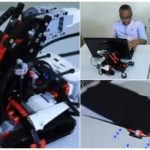I spent the first 23 years of my life in exile.
My family was forced to leave South Africa in 1963 when I was six months old; my father was a leading figure in South Africa’s liberation movement and following the arrest of Nelson Mandela he was ordered to flee the country by his comrades. We were forced to resettle in the UK.
Growing up in England, I had no memory of my home country, having left so young. But I remember it being engrained in me that we were not English, we were South African; and that in a few years’ time we would be going home. But those few years were continually extended.
Not being able to return home was a matter of great pain to my parents and older siblings. I grew up in a house with lots of depression, tears and sadness brought on by exile.
But it did not stop my father from continuing his work from afar.
Our home became the centre of a political movement.
In the early 1970s, we often had black student radicals pass through. By 1976, when I was 13 years old, my father was a leading member of the Pan Africanist Congress, which helped build the school student movement that erupted in Soweto that year.
Our house was busy, noisy and full of argument and debate. At times, there was very real anger and anguish, and emotions were particularly heightened when we received news of assassinations from home.

I did commit myself while still a school student, which meant fighting from where I was in the UK. I found myself – at the age of 16 – becoming the full-time chairperson of the National Union of School Students. I was in many ways English and realised resistance took on many forms. We were campaigning for a free and equal South Africa and supporting other causes, but our fight focused on everyday issues such as corporal punishment, school uniforms and the right to organise.
Return to South Africa
Sometime later and two years into my university education in London, South Africa was on fire again and I was occupying banks and supermarkets as part of the local anti-apartheid campaign.
By 1990, the white regime was forced to make reforms that allowed exiles like ourselves to return home legally. I was in Zimbabwe at the time, where I had enrolled to finish my studies because I wanted to be closer to home.
My father and I were among the first to go back.
Returning home was extremely exhilarating. I remember arriving in Cape Town and crying about how beautiful my country and town of birth was. We arrived two days before Nelson Mandela was released and I went into town to hear him address the crowds.
It was moving but very chaotic and violent. Fighting broke out between the police and township youth during his speech. I arrived home drenched in the blood of people that I had carried to ambulances.
The frenzy was counteracted by the very heartening response we received; everywhere we went announcements were made that “we have returning exiles in our midst,” and we were applauded and lighters were ignited. It was quite overwhelming.

Wits was and remains an elite university.
Back then black students were a minority and white liberal universities were still in denial about their racially exclusive culture. I often felt suffocated by the whiteness of the space, in this instance it’s Englishness, that had both shaped me since childhood and revolted me.
It could be summed up as “we might be a former colonial outpost but we can and are at times competing with the best.” That meant a big emphasis on research, often to the detriment of teaching time, sorely needed for many of the black students who had not had a decent high school education to prepare them for university.
It was the typical postcolonial thing, keeping standards up at all costs.
I vividly recall one instance; I was representing the postgraduate student body in the newly established Transformation Council when I heartily objected to a professor who labelled affirmative action a racist policy. The chairperson demanded I apologise or leave the meeting. I left and never returned to the council.
Free, quality, decolonised education for all
I was politically active at Wits and was part of a militant socialist student society on campus. Little did we know that, 20 years later, we would see a powerful resurgence of student protests, one that at times would take aim at the failures of my generation to secure a truly democratic South Africa.
In 2015, students at the University of Cape Town called for the removal of a Cecil Rhodes statue and the end of institutional racism in the university. It was a movement borne from the same sense of alienation and frustration that I had felt so keenly as a student.
The protest sparked a wildfire that could not be easily quelled. Its slogans of black power and demands for the Africanisation of the university echoed the politics of the 1970s that I heard and embraced at home as a child.

They had become deeply frustrated when their demand to block a rise in tuition fees was summarily dismissed by the university. Within the space of a few days, tens of thousands of students from universities across the country had joined the protest movement calling for no rise in tuition fees.
The student mobilisation was massive – far bigger and noisier then we had been able to achieve in my days as a student activist.
During the occupation, a new form of organisation developed. It was a flat structure, where everybody led through the development of task teams for food, health, education, and shelter. At times it looked like a human beehive.
The entrenched culture of putting one’s own political affiliations and agendas first was also set aside. Their almost continuous assembly became the heart of all debates and decision-making. New young black female voices also came to the fore.
I pitched up at the university a week after protests started to film the developments. I was promptly told by the student media task team that I and my camera team were not welcome inside the occupation. For any filming to take place I would need permission from the media committee.
Rather taken aback, I retorted: “But don’t you know who I am? I am the maker of Miners Shot Down.”
They replied: “We don’t care who you are, don’t come here with your ego.”
It was a wakeup call. The students were now in charge, and by then they were not simply demanding an end to rising tuition fees; they were demanding free, quality, decolonised education for all.
They were also pressing for the end of outsourcing support staff. About fifteen years back, Wits had cut costs by ending contracts for existing support staff, cleaners, kitchen, maintenance and ground staff and instead relying on outside private contractors who had to work without benefits such as medical aid and housing allowance.

The student rebellion had reminded me of the unfinished business of transitioning to a democracy.
Twenty years ago, black students at Wits were still a minority, something that forced us to tread carefully but also bred a conservatism that was born of the fact that we were being groomed to enter a system whose racial exclusivity in many ways remained intact.
This generation did not have much time for the likes of my generation of anti-apartheid activists who behaved like they knew what was best for the young.
The students felt the elders were not listening to them or, at best, were indifferent to their experience and pain. The context of fear and insecurity of one’s own future is prevalent. Unemployment figures officially stand at 28 percent nationally and 55 percent for those between 15 and 24 years of age, the highest figure in the world for a middle-income economy like ours.
I was witnessing a rigorous re-examination of the entire foundations that underlay the new South Africa. I was at once suspicious and enthralled and this tension led me to commit to the film project if they resolved to fight on.
Students, perhaps more so than other groups, can be fickle; they are on their way up. My initial mistrust of their resolve and commitment to social change quickly melted away as they pressed home their demands regardless of personal consequence and won an astonishing victory that ended outsourcing.
While at times they showed unbridled self-importance, a moral righteousness which I could understand, the tendency to essentialise race I found reprehensible and a step backwards.
But it was clear to all that a new generation with a steely resolve to challenge the status quo had emerged, an inheritance that my own peers had failed to change, a point they would continually painfully remind us of.
They made me feel complicit in our highly unequal society and in some ways they are right.

This informed the motivation and design of the film, to make a piece that, while capturing the highs and lows of their struggle, allowed us to reflect on the wider conversation and debate that they placed in very powerful terms onto the table, a cross-generational dialogue.
The film has found resonance around the world as others encounter the same problem: turning public goods and services into business operations is not working for society, particularly for the young.
In 2018, activists won a hugely significant reform: free education for the poor, and the equivalent of billions of US dollars injected into education.
They are continuing to agitate for more and those activists that have left university are to be found in all areas of civil society, reinvigorating our struggle to control our destiny and making me proud to be South African again.
The world needs to watch this space. They inspired us by turning what we have been told is impossible into the possible. They have embodied the 1968 slogan the reverberated around the world in the wake of an insurgent student movement: “All power to the imagination”.













